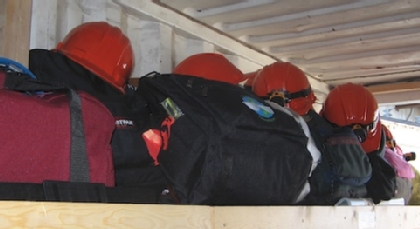PLU first responders
Over the last year, Search and Rescue and Building Inspection teams have been training to be best prepared for an emergency.
Last winter, a call out to the PLU community garnered several volunteers interested in joining the PLU Search and Rescue team.

Those interested in volunteering for the Search and Rescue team should contact Emergency Program Manager Jennifer Wamboldt at ext. 6042 or by e-mail at wamboljm@plu.edu.
“It was amazing,” said Jennifer Wamboldt, emergency program manager. “We had people coming from all areas of campus with all sorts of backgrounds.”
Having response preparation is vital, she said.
“Basically we’re going to have to be first responders and in the case of a disaster, like an earthquake, we’re going to have be on our own for one or two hours or perhaps as much as a week,” said Duncan Foley, a PLU geosciences professor and building inspection team member.
The team has already gone through several training exercises, with more planned. PLU worked with Central Pierce Fire and Rescue, through the Pierce County Department of Emergency Management to provide training.
Training includes: radio use, first aid, as well as situation assessment, such as how to conduct a search, move and carry people, and use of gear.
Search and rescue would work hand-in-hand with the building inspection team, which is comprised of facility management staff, led by David Kohler, director of facilities management.
“Kolher’s leadership has really helped guide the building inspector team along,” Wamboldt said.
They’ve under gone training in assessing and recognizing where to look for structural damage, what it looks like and how to move forward with that assessment.
“They went through training with an engineering firm and produced guidebooks that are specific to each building,” Wamboldt said. “They know where and what to look for.”
Two buildings take from 30 minutes to an hour to inspect once emergency operations are in place.
“I’m really happy with the preparation and the training,” she said.
Volunteer
Those interested in volunteering for the Search and Rescue team should contact Wamboldt at ext. 6042 or by e-mail at wamboljm@plu.edu.
Lock down drill
During the week of Feb. 28-March 4 there will be a lock down drill at PLU.
Volunteers are needed to help run the exercise. If interested, contact Wamboldt at ext. 6042 or by e-mail at wamboljm@plu.edu.
Drills like this are necessary for promoting personal safety on campus. The drill will be a practice and test of protocols for initiating a campus modified lock down, such as the presence of a nearby threat. Campus response will be tested, as well the campus notification systems and building lock down plans and procedures.


